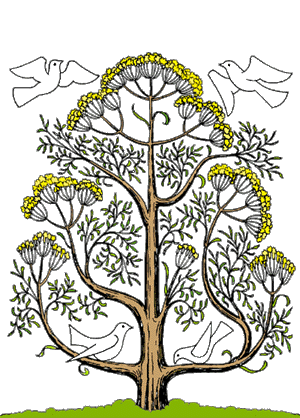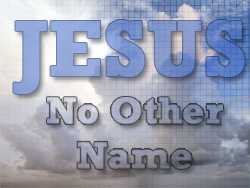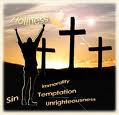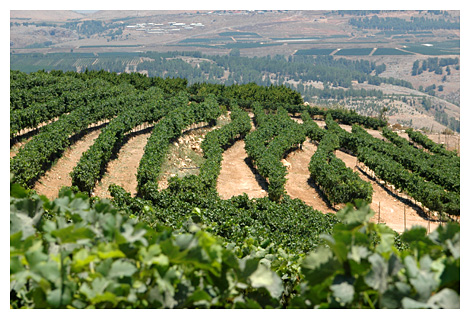
The Parable of the Mustard Seed
30 Again he said, “What shall we say the kingdom of God is like, or what parable shall we use to describe it? 31 It is like a mustard seed, which is the smallest seed you plant in the ground. 32 Yet when planted, it grows and becomes the largest of all garden plants, with such big branches that the birds of the air can perch in its shade.” 33 With many similar parables Jesus spoke the word to them, as much as they could understand. 34 He did not say anything to them without using a parable. But when he was alone with his own disciples, he explained everything. (Mark 4:30-34)
A description of the botanic characteristics of the mustard seed is interesting.
The seed of both black and white mustard is similar in size, about 1.0 to 3.0 mm (1/8 inch)(11) so it is not the smallest seed but it is the smallest seed of those which "you plant in the ground" clearly indicating that the Lord was not comparing the mustard seed to all plants but only to those which were commonly grown. There would be numerous plants familiar to His audience with smaller seeds, of which the best example would be the seed of the black orchid. But there are few plants which grow so large in one season as a mustard, and few plants would be characterized by such rapid germination of the seed. Mustard planted one day could begin growing the next.
A grown black mustard would still be a herb, botanically speaking, but sometimes a very big herb, popularly considered a shrub. There are wild mustard plants over ten feet tall near the Jordan River, and even in moderate climate a mustard plant may grow that tall, provided it gets enough sunshine. It must, moreover, be remarked that generally trees in most parts of the Holy Land do not reach a large stature. The stem of a mustard plant also becomes dry and wood-like, which gives it the aspect of a tree.....
In summary, the three features of the mustard plant emphasized by the Lord are the small size of the seed, the large size of the plant in relation to the seed, and the rapid growth.(Bible Plants - Old Dominion University)
Again we must be careful not to read more into the parable than Jesus was meaning. While much speculation has been made about the birds and what they represent, the most likely explanation is that Jesus was making the point that the tree (large shrub) had rapidly grown big from a very small seed, large enough for birds to land on it.
In Jewish understanding, prophecy generally has past, present and future applications.
I would suggest that this perception also applies to this parable.
Obviously teachings of Jesus were only a very small seed at the time, eventually attracting no more than a tiny number of people.
15 In those days Peter stood up among the believers (a group numbering about a hundred and twenty) (Acts 1:15)
Over the next months, years and centuries, through the empowerment of the Holy Spirit, the kingdom grew rapidly. For example:
38 Peter replied, “Repent and be baptized, every one of you, in the name of Jesus Christ for the forgiveness of your sins. And you will receive the gift of the Holy Spirit. 39 The promise is for you and your children and for all who are far off—for all whom the Lord our God will call.” 40 With many other words he warned them; and he pleaded with them, “Save yourselves from this corrupt generation.” 41 Those who accepted his message were baptized, and about three thousand were added to their number that day. (Acts 2:38-41)
Reality is, since that time, the kingdom has grown fastest where and when the light of the Holy Spirit has been allowed to operate in and through His people.
The Dark Ages, so named because the light of the Holy Spirit was generally extinguished in the church, saw the kingdom basically shrivel and die, as the mustard plant does on an annual basis. The seed remained however, in small groups of those who continued to be led by the Spirit and were harshly persecuted for it.
After a thousand years or so, the flame of the Holy Spirit grew into the fire of the Reformation and spread like wildfire throughout the world.
Since that time there have been ups and down's, but the growth of the kingdom plant has been fertilised by the Holy Spirit through revivals. Now we are receiving the understanding that the kingdom is not something just for when we die, or for when the world ends, but to is be established upon the earth through the holy and righteous lives of His disciples.
"Thy kingdom come. Thy will be done in earth, as it is in heaven." (Matthew 6:10 KJV)
I quote from Doug Fortune, who has studied the Greek meaning of this statement in the Lord's Prayer.
The word translated as "be done" is ginomai in Greek, its' meanings include- to cause to be, it is the “gen” in the English word generate, to become or come into being, be brought (to pass), be fulfilled. As we pray, Thy will be done, it is a creative declaration that reaches into the spiritual realm and serves as a catalyst for His will to be “gen” -erated, a spiritual genesis established in earth, thus causing it to be manifested in the natural realm. It is much more than just wishful thinking! It is a creative genesis! (In Earth as it is in Heaven by Doug Fortune)
When I was a relatively new believer I completed a 30 week, (2 hours a week) course called 'Word of Life'. My only theological training. It was through this course that I came into the things of the Holy Spirit, for which I am eternally grateful. At the conclusion of the course the graduates participated in a 'Presbytery' where two outside prophets were brought in to prophecy over our lives. For me, the two prophecies were along similar lines but using different imagery. The first was about me being like the mustard plant, growing into a big tree, while the second was about climbing up a mountain, higher than others had gone, but being guided in my steps, my direction, by Jesus, who had walked the path before me.
Throughout the nearly 20 years since I have pondered on these things as I have done my little bit in life and ministry to be a disciple of Jesus.
However, as I have written about this parable, I have had a new insight into what the Lord was saying to me that evening, long ago. For many are now getting the revelation that the kingdom of God is indeed like a spiritual mustard tree which is and will continue grow rapidly upon the earth in these end times.
My desire is to be a part of His kingdom now. Yours too?
(Continued next week)



